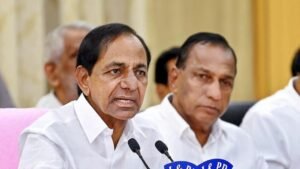
Background of the Issue:
The Kaleshwaram Lift Irrigation Scheme (KILS) stands as one of Telangana’s ambitious infrastructural projects aimed at addressing water scarcity and bolstering agricultural productivity. Spearheaded by the Telangana Rashtra Samithi (TRS) government under the leadership of Chief Minister K Chandrashekar Rao, KILS represents a monumental effort to harness water resources for the state’s development. However, the project’s implementation has been marred by controversies, particularly concerning its financial implications and alleged mismanagement.
Hanumantha Rao’s Allegations:
In his formal communication to the Election Commission of India (ECI), Hanumantha Rao articulates grave concerns regarding the financial burden incurred by the state government through the Kaleshwaram Lift Irrigation Scheme (KILS). He contends that the Bharat Rashtra Samithi (BRS), led by K Chandrashekar Rao, should be disqualified from participating in electoral processes until the debts associated with KILS are adequately addressed. Rao’s appeal underscores the accountability of political parties in managing public finances and the imperative of transparency in governance.
Analysis of Rao’s Appeal:
Hanumantha Rao’s appeal reflects broader apprehensions about the accountability of political incumbents and the prudent management of public resources. By invoking the electoral authority, Rao seeks to hold the BRS accountable for its stewardship of state finances and the ramifications of its flagship irrigation project. The temporal dimension of his proposal, extending the ban until 2036 or the fiscal year 2035-2036, underscores the severity of the financial predicament and the need for sustained scrutiny of political conduct.
Legal and Constitutional Implications:
The invocation of the Election Commission of India (ECI) to adjudicate on the disqualification of a political party raises pertinent legal and constitutional considerations. While electoral oversight mechanisms exist to ensure the fairness and integrity of democratic processes, the imposition of punitive measures such as disqualification necessitates a rigorous assessment of legal provisions, precedents, and procedural safeguards. Hanumantha Rao’s appeal prompts a nuanced examination of the statutory framework governing electoral accountability and the separation of powers between the judiciary, executive, and legislature.
Political Ramifications:
Beyond its legal ramifications, Hanumantha Rao’s appeal reverberates across Telangana’s political landscape, shaping narratives of governance, opposition dynamics, and electoral strategies. The confrontation between the Congress party and the ruling Bharat Rashtra Samithi (BRS) underscores the competitive nature of multiparty democracy and the pursuit of political advantage through institutional channels. Rao’s initiative may galvanize opposition forces, mobilize public opinion, and recalibrate power dynamics within the state’s political ecosystem.
Public Perception and Discourse:
The public discourse surrounding Hanumantha Rao’s appeal reflects divergent perspectives on governance, accountability, and electoral ethics. While some segments of society applaud his efforts to uphold fiscal probity and transparency, others question the timing and motivations behind his intervention. The articulation of competing narratives, fueled by partisan allegiances and ideological affiliations, underscores the complexity of democratic discourse and the plurality of voices in shaping public opinion.
Media Representation and Coverage:
The media’s role in shaping perceptions of Hanumantha Rao’s appeal cannot be understated. News outlets, opinion makers, and social media platforms serve as conduits for disseminating information, framing debates, and amplifying political narratives. The coverage of Rao’s petition against the Bharat Rashtra Samithi (BRS) reflects the media’s interpretative lens, editorial biases, and agenda-setting function. Through investigative journalism, editorial commentary, and public discourse, the media plays a pivotal role in mediating between political actors and the electorate.
Hanumantha Rao’s appeal to the Election Commission of India (ECI) for the disqualification of the Bharat Rashtra Samithi (BRS) underscores the interplay between governance, accountability, and democratic institutions in Telangana. His initiative reflects a broader commitment to transparency, fiscal responsibility, and electoral integrity, while also raising questions about the efficacy of institutional mechanisms in safeguarding democratic norms. As the political landscape continues to evolve, Rao’s appeal serves as a catalyst for introspection, debate, and reform in the realm of electoral governance and public accountability.
In a nutshell, Hanumantha Rao’s petition represents a pivotal moment in Telangana’s political trajectory, highlighting the tension between electoral imperatives and governance imperatives, and the enduring quest for democratic renewal and public trust.
1 thought on ““Exclusive: Inside Hanumantha Rao’s “Bold Move” to “Shake Up.” Telangana Politics! Find Out Why His Appeal Has Everyone Talking!””